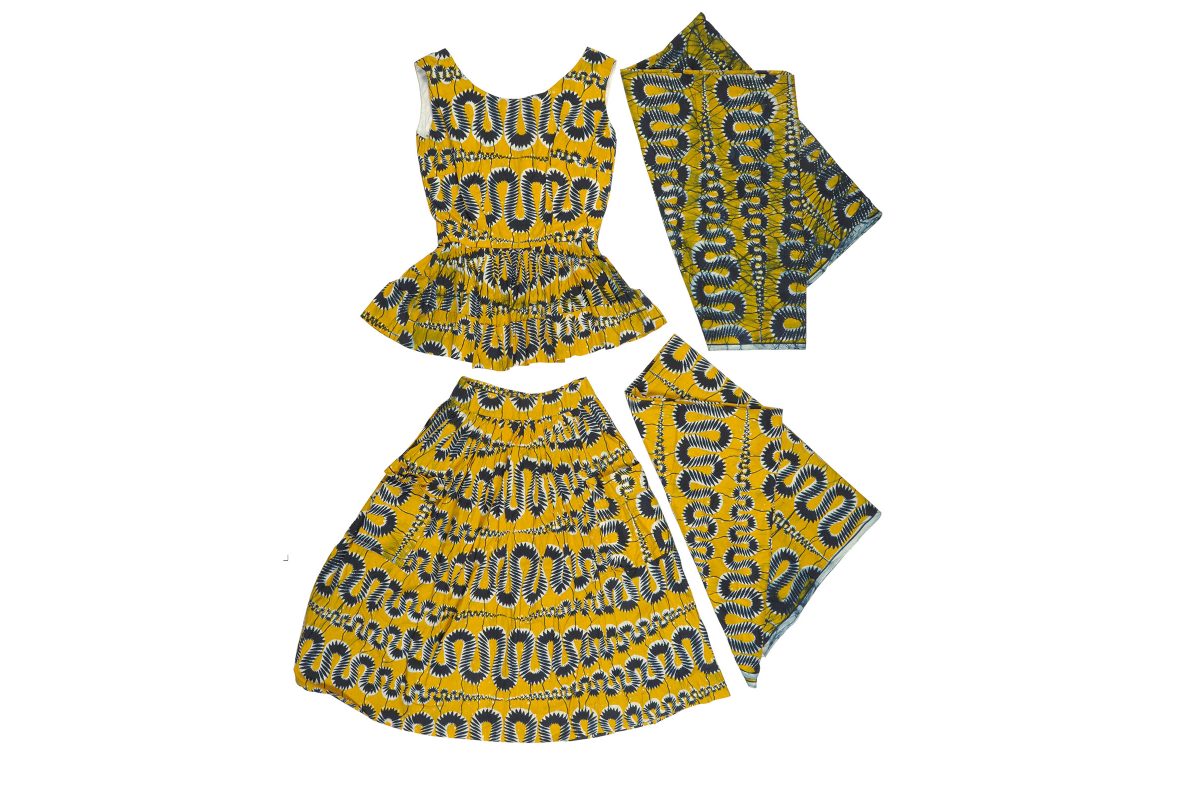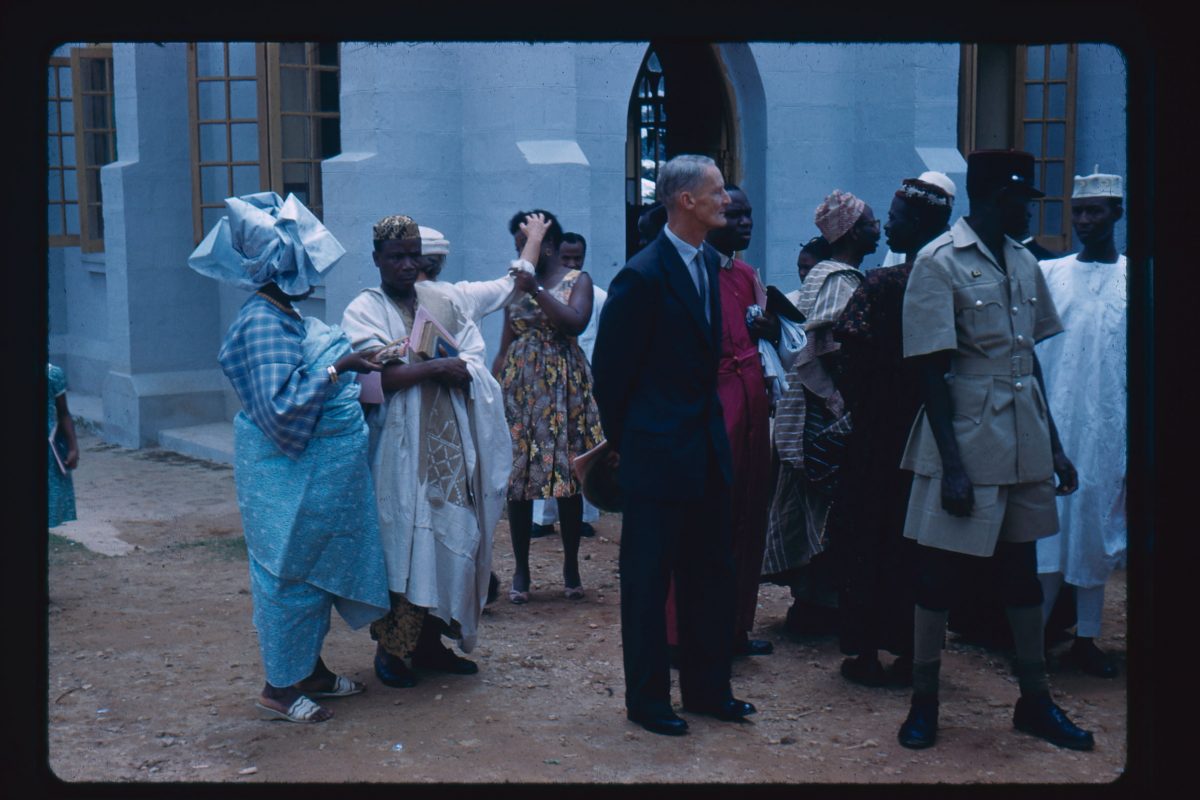Nigeria60
Nigeria60 focuses on collections, memories, words, music and images to both celebrate the global impact of Nigerian creativity, and offer a time to pause, reflect and plan for change.
The seed for this project was sown three years ago through a conversation between two friends, colleagues and women; one Nigerian (designer and artist, Alafuro Sikoki-Coleman) and the other British/Swedish (Horniman Deputy Keeper of Anthropology, Johanna Zetterstrom-Sharp).
Their conversation was held around the meeting of three collections:
- the Horniman’s collection from 1960s Nigeria, including textiles, homeware, clothing and an extensive archive of photographs.
- Alafuro’s collection of objects that have become iconic of the Independence period in Nigeria, represented in her work Private Atlas: Nigeria 1960.
- the collection of a British family who lived in Nigeria in the 1960s and recently offered clothing and objects from their home in Ibadan to the Horniman.
Nigeria60 recognises periods of shared Nigerian and British pasts, and their imprints in the present, whilst also imagining a different future. The project has, since its inception, expanded to include five interlinking components:
- a social media conversation launching in September 2020 around photographs of Nigerians in Nigeria and the UK in the 1960s, called ‘Then and Now’. This is led by Oluseyi Awolesi, in conversation with historians Amanda Kirby Okoye and Emeka Keazor, poet Yomi Sode, and ASIRI Magazine;
- a series of public conversations, curated by Dr Yewande Okuleye, focusing on Nigerian poetry, music, art, theatre and food in Nigeria and the diaspora, launching in October 2020;
- conversations throughout 2020 about the future of the Nigerian collections at the Horniman, using the 60th anniversary of Nigerian Independence as a different starting point and linking with the Rethinking Relationships project;
- a new installation in the World Gallery, created in collaboration with Alafuro Sikoki-Coleman. This is a development of her work Private Atlas: Nigeria 1960, brought together with the Horniman’s collection from 1960s Nigeria. It is due to open in Spring 2021.
- a summer programme at the Horniman of installations, theatre, talks and music planned for 2021, featuring Dele Sosimi and Decolonising the Archive.

Project Collaborators
Alafuro Sikoki-Coleman: Alafuro is an industrial designer and artist. She founded Studio Sikoki, a design, art and research facility for exploring the dynamics between objects, users and the environment.
Alafuro’s work on gender photography, furniture and artefact design, conceptual installations and fashion sculpture has been widely exhibited globally and she has given lectures and presentations on her studio practice, cultural significance and community engagement.
Alafuro Sikoki-Coleman’s piece Woyingi is currently on display in the Nigerian encounter of the World Gallery. Follow Alafuro: @studiosikoki
Johanna Zetterstrom-Sharp: Johanna is a Deputy Keeper of Anthropology at the Horniman.
“I met Alafuro back in 2016, when I had just begun a British Academy three-year research project exploring collections in UK museums from the end of the British Empire in Africa. Our conversation covered motherhood and diasporic belonging, but settled on the relationship between migration, materiality and the everyday. Planning for Nigeria60 began with an idea we had for an exhibition that would take a foundational moment in our shared British and Nigerian history and present it in a way that would draw lines of personal recognition, connection and critical reflection through conversations around everyday objects and images. It has been such a joy to work on, since this initial conversation has led to so many others, culminating in the multi-faceted project we have today. I am very excited to see how the conversation evolves.”
JC Niala: JC is the African Collections Researcher at the Horniman, coordinating the Rethinking relationships and building trust around African collections project. As part of the project, together with Nigerians on the African continent and in the diaspora, the Horniman has been developing thinking about the future of the collections.
“I was drawn to one of the photographs from the Nancy Stanfield collections because it spoke to me of a moment many African women can relate to. Behind the beautifully dressed African couple, there is a European woman in a white hat who is touching the hair of an African woman, while addressing someone who is not captured in the photo. The African woman has her hand on the European woman’s arm in a manner that I have interpreted as a ‘Don’t touch my hair’ moment. We will likely never know what actually happened but I am fascinated by the possible readings that are offered by these sets of photographs. I look forward to Nigerians from around the world giving each other (and us) a window into their view of the 1960s.”

Oluseyi Awolesi: Oluseyi is a Design Architect, Job Runner, Project Coordinator and Manager with a varied project portfolio of over 23 years’ experience within the residential, commercial, healthcare, laboratory, education, leisure, hospitality, master plan and urban design sectors.
Seyi is also a consultant working with brands to achieve their targeted objectives and providing design-led intelligent solutions to projects in Europe, the Middle East and Africa.
As an Events Creator, Curator, Artist manager and Director with 14 years’ experience within the music, art, poetry, artist development, music video and photography and creative sectors, Seyi has worked on numerous events providing exciting and interesting narratives that bring commentary and empower change.
Dr Yewande Okuleye: Dr Yewande Okuleye is an interdisciplinary scholar with degrees in biochemistry, fine art, research methodology and the history of medicine.
Yewande’s role as a public historian focuses on the development of public history Afrocentric programmes which decolonise archives, museums and cultural spaces. Her Research-in-Action project, “What has history got to do with it?”, applies oral history interviews, inter-generational focus groups, action research, narrative inquiry and digital ethnography, as research methodologies, to question the power structures and processes which consistently re(marginalise) and submerge African voices. Her wider published research has included work on the intellectual history of the emergence of animal ethics and vegetarianism. This interest in ethics and food history informs her research about the role Nigerian food plays in identity and belonging in Diaspora. Nigerian food is much more than Jollof rice.
Yewande has curated exhibitions and events in arts and heritage spaces in Cuba, Nigeria and the UK. For example, the # I am a Yoruba Mother WW1 project developed with Big Ideas, was the only representation of Nigerian mothers and soldiers presented at the 2018 Armistice commemoration. This act of remembrance defines Yewande’s mission, to invite Nigerians to become active participants in shaping the decolonial project and reclaiming their history.
Tara Okeke: Tara is a writer, artist and aspiring anthropologist. As the Horniman’s Museum Futures Trainee – a role borne out of an allied framework set out by the National Lottery Heritage Fund and the British Museum to diversify the sector – Tara specialises in digital production, preservation and documentation (and, formerly, worked on the development and delivery of 696).
Guided by an interest in the intersection between culture and care, Tara strives to connect the dots between artefacts, infrastructures and agents of positive change.
She has, in previous roles:
- co-facilitated dementia-friendly reminiscence workshops for seniors and others afflicted by degenerative conditions;
- contributed to foundational research concerning ethnically diverse heritage spaces and conservation praxes for the Stephen Lawrence Charitable Trust’s ‘Connecting People and Places’ report; and
- conducted fieldwork centred on spatial equity, refuge and ecologies of respite in Athens with UCL’s Development Planning Unit (DPU).
With a practice that melds social-spatial endeavour (in 2017, she was selected as the youngest member of the h100 award-nominated programme, New Architecture Writers) with socio-political analysis (in 2014, she was shortlisted in the top 10 of the country for Amnesty International’s Young Reporter Competition), Tara now hopes to extend her reach as a cultural practitioner within the heritage sector.
Amanda Kirby Okoye: Amanda is a Lawyer, Image historian and Creative Director of Joliba Africa. Joliba Africa is a non-profit organisation, established in 2013 by Amanda as a response to an overwhelming need to educate, empower and create awareness of Nigerian history and its cultures.
It is a research and acquisition-based organisation focused on heritage preservation led by a team of archivists, curators and information professionals. Its mission is to care for Nigeria’s artefactual, written and pictorial heritage, making it relevant and accessible to all, whilst continually engaging and improving the audiences’ experience.
Joliba Africa actively participates in the protection of historically significant and cultural resources. It also engages in public education using multi-dimensional platforms to disseminate information. Amanda brings with her a wealth of knowledge, specialising in pre-Nigeria and colonial history, and has built an enviable collection and relationship with organisations nationally and internationally.
“Our objective is to inspire Nigerians to know more about their rich history through visual communication. We choose this method because, simply, how can you put into words what you can see with your eyes? Learning history through images is so much more interesting!! Organisations like ours are critical to what is needed today in developing the knowledge and the mindset of Nigerians at home and abroad.”
Yomi Sode: Yomi is a Nigerian British writer, performer, and facilitator. He is a recipient of the Jerwood Compton Poetry fellowship 2019.
He has read his poems internationally at various festivals, as well as performed his debut solo show (COAT) to sold-out audiences. Yomi has been published in Rialto Magazine, The Poetry Review, the Bare Lit Anthology and Ten: Poets of the New Generation, as well an essay contribution in SAFE: On Black British Men reclaiming space.
Emeka Keazor: Emeka Keazor is an historian, lawyer, filmmaker, and writer, who for over 28 years has been researching and documenting important outposts in the making of modern Nigeria.
He is the author of several critically acclaimed books, documentaries and presentations, spanning subjects from socio-economic history to law, such as:
- The Lagos-Hamburg Line: A Brief History of German Companies in Nigeria;
- 120 Greatest Nigerians We Never Knew;
- The Constructive Dismissal Conundrum: A Toolkit;
- Lagos: The Birth of a City of Style;
- Onunaekwuluora: The Legend of Thurstan Shaw amongst others.
A recipient of the 2014 award of the Cambridge University African Society for his work in African History, he is a respected authority on Nigerian History and consulted by a number of global media platforms, such as CNN, BBC, Al-Jazeera, Reuters, New York Times, and Iranian Press TV.
He is on the board of ’Iba-Ajie’ (The Ukpabi Asika Knowledge Resource Centre), Alto Historical Media and Publishing Limited, a consultant with Rose and Berkeley Chambers Lagos and a Trustee of the Nigerian Legal History Society.
ASIRI Magazine: ASIRI is a cultural and historical brand set up to preserve and promote the cultural heritage and history of Nigeria, and has been featured in Wings Magazine (in-flight magazine for Arik Air) as one of Nigeria’s Cultural Preservers and also named as one of the top emerging brands of 2014 by Arise Magazine (UK).
Established in 2013 with the sole objective of promoting Nigerian history, culture and arts, ASIRI has grown to be one of the largest collectors of archival images and data on Nigerian history. With its three major arms set in research, exhibition, curating and publication, ASIRI has established itself as the vanguard of Nigeria’s history archive portal.
ASIRI Magazine has been involved in research projects, cultural events in and out of Nigeria, research projects and, most importantly, advocacy in terms of protecting cultural/historical landmarks and heritage sites.
The ASIRI Magazine digital platforms which include Facebook, Twitter and Instagram educate and inform an average of 8,200 people weekly on the importance of Nigerian history, culture, heritage and arts. ASIRI is the contemporary way of re-discovering Nigerian history, culture, heritage and arts.
